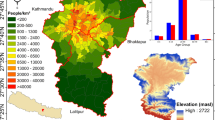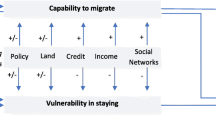Abstract
Frequency and severity of extreme weather events, such as floods or heat waves, increase as a result of climate change. Therefore, it is important to investigate which factors might influence adaptation decisions at the household level. In this context, we examine whether adaptation behavior is related to adaptation decisions reported by neighboring households or to the perception that neighbors have implemented such measures. The empirical analysis is based on a large-scale household survey in Germany (4784 geo-located households) and multivariate regressions of different types of adaptation behavior: structural/behavioral flood and heat adaptation measures as well as the purchase of flood insurance for residential buildings and contents. We contribute to existing research inter alia by providing first insights on neighborhood effects regarding heat adaptation and by considering adaptation behavior as it is reported by neighbors, rather than as it is perceived by survey respondents. The results suggest positive neighborhood effects in the context of structural adaptation measures, but no effects on insurance purchase decisions. Neighborhood effects on flood adaptation are stronger for households without prior flood experience and depend on available household income. These findings show that individuals’ climate adaptation behavior may be affected by the observed behavior of social peers. Therefore, neighborhood effects are important to be considered by policy-makers to strengthen private adaptation behavior.




Similar content being viewed by others
Data availability
The data that support the findings of this study are available from the corresponding author upon reasonable request.
Notes
“The program aimed to help Floridians identify potential weaknesses in their homes and make structural improvements to strengthen their homes by providing funding for free home hurricane mitigation inspections and subsidized home improvement grants.” (Carson et al. 2013, p. 2)
The sensitivity of results regarding these coding decisions is tested in various robustness checks.
In accordance with protection motivation theory, we also account for individuals’ coping appraisal. However, due to the large number of missing values and limited effects on the main results, it is only included in a robustness check.
References
Aerts JCJH (2018) A review of cost estimates for flood adaptation. Water 10:1646. https://doi.org/10.3390/w10111646
Ajzen I (1985) From intentions to actions: a theory of planned behavior. In: Kuhl IJ, Beckmann J (eds) Action control: from cognition to behavior. Springer-Verlag, Berlin, Heidelber, New York, pp 11–39
Allcott H, Rogers T (2014) The short-run and long-run effects of behavioral interventions: experimental evidence from energy conservation. Am Econ Rev 104(10):3003–3037
Bonan J, Cattaneo C, D’Adda G, Tavoni M (2020) The interaction of descriptive and injunctive social norms in promoting energy conservation. Nat Energy 5(11):900–909. https://doi.org/10.1038/s41560-020-00719-z
Botzen WJW, Kunreuther H, Czajkowski J, de Moel H (2019a) Adoption of individual flood damage mitigation measures in New York City: an extension of protection motivation theory. Risk Anal 39(10):2143–5159. https://doi.org/10.1111/risa.13318
Botzen WJW, Kunreuther H, Michel-Kerjan E (2019b) Protecting against disaster risks: why insurance and prevention may be complements. J Risk Uncertain 59(2):151–169. https://doi.org/10.1007/s11166-019-09312-6
Bubeck P, Botzen WJW, Kreibich H, Aerts JCJH (2013) Detailed insights into the influence of flood-coping appraisals on mitigation behaviour. Glob Environ Chang 23(5):1327–1338. https://doi.org/10.1016/j.gloenvcha.2013.05.009
Buchanan MK, Oppenheimer M, Parris A (2019) Values, bias, and stressors affect intentions to adapt to coastal flood risk: a case study from New York city. Weather, Climate Soc 11(4):809–821. https://doi.org/10.1175/WCAS-D-18-0082.1
Cai J, De Janvry A, Sadoulet E (2015) Social networks and the decision to insure. Am Econ J Appl Econ 7(2):81–108. https://doi.org/10.1257/app.20130442
Carson JM, McCullough KA, Pooser DM (2013) Deciding whether to invest in mitigation measures: evidence from Florida. J Risk Insur 80(2):309–327. https://doi.org/10.1111/j.1539-6975.2012.01484.x
De Cian E, Pavanello F, Randazzo T, Mistry MN, Davide M (2019) Households’ adaptation in a warming climate. Air conditioning and thermal insulation choices. Environ Sci Pol 100:136–157. https://doi.org/10.1016/J.ENVSCI.2019.06.015
Dickinson KL, Brenkert-Smith H, Madonia G, Flores NE (2020) Risk interdependency, social norms, and wildfire mitigation: a choice experiment. Nat Hazards 103:1327–1354. https://doi.org/10.1007/s11069-020-04037-1
Dittrich R, Wreford A, Butler A, Moran D (2016) The impact of flood action groups on the uptake of flood management measures. Clim Chang 138(3–4):471–489. https://doi.org/10.1007/s10584-016-1752-8
Fan Y, McCann L, Qin H (2017) Households’ adoption of drought tolerant plants: an adaptation to climate change? J Agric Resour Econ 42(2):236–254 http://www.jstor.org/stable/44329752
Foster J, Hodder SG, Lloyd AB, Havenith G (2020) Individual responses to heat stress: implications for hyperthermia and physical work capacity. Front Physiol 11:541483. https://doi.org/10.3389/fphys.2020.541483
GDV (2021) Naturgefahrenreport 2021. Gesamtverband der Deutschen Versicherungswirtschaft (Association of the German Insurance Industry). https://www.gdv.de/resource/blob/71294/ebaad3ff1563be2b92e0dd0ce4c0751c/download-naturgefahren-report-data.pdf, accessed May 20, 2023
Grislain-Letrémy C (2018) Natural disasters: exposure and underinsurance. Ann Econ Stat 128:53–83
Grothmann T (2005) Klimawandel, Wetterextreme und private Schadensprävention. Entwicklung Überprüfung und praktische Anwendbarkeit. Dissertation. Universität Magdeburg, Magdeburg
Hudson P (2020) The affordability of flood risk property-level adaptation measures. Risk Anal 40(6):1151–1167. https://doi.org/10.1111/risa.13465
Jachimowicz JM, Hauser OP, O’Brien JD, Sherman E, Galinsky AD (2018) The critical role of second-order normative beliefs in predicting energy conservation. Nat Hum Behav 2(10):757–764. https://doi.org/10.1038/s41562-018-0434-0
Jansson J, Pettersson T, Mannberg A, Brännlund R, Lindgren U (2017) Adoption of alternative fuel vehicles: influence from neighbors, family and coworkers. Transp Res Part D: Transp Environ 54:61–73. https://doi.org/10.1016/j.trd.2017.04.012
Klein J, Juhola S, Landauer M (2017) Local authorities and the engagement of private actors in climate change adaptation. Environ Plan C: Gov Policy 35(6):1055–1074. https://doi.org/10.1177/0263774X16680819
Kraehnert K, Osberghaus D, Hott C, Habtemariam LT, Wätzold F et al (2021) Insurance against extreme weather events: an overview. Rev Econ 72(2):71–95. https://doi.org/10.1515/roe-2021-0024
Krawczyk M, Trautmann ST, van de Kuilen G (2018) Peer effects in catastrophic risk insurance take-up. In T. Tyszka & P. Zielonka (Eds.), Large risks with low probabilities: perceptions and willingness to take preventive measures against flooding (pp. 141–156). IWA Publishing. https://doi.org/10.2166/9781780408606_141
Krawczyk MW, Trautmann ST, van de Kuilen G (2017) Catastrophic risk: social influences on insurance decisions. Theor Decis 82(3):309–326. https://doi.org/10.1007/s11238-016-9571-y
Kunreuther H, Ginsberg R, Miller L, Sagi P, Slovic P et al (1978) Disaster Insurance Protection Public Policy Lessons. Wiley Interscience Publications. Toronto, Canada
Kussel G (2018) Adaptation to climate variability: evidence for German households. Ecol Econ 143:1–9. https://doi.org/10.1007/s10273-011-1262-2
Lo AY (2013) The role of social norms in climate adaptation: mediating risk perception and flood insurance purchase. Glob Environ Chang, 23(5). https://doi.org/10.1016/j.gloenvcha.2013.07.019
Lo AY, Chan F (2017) Preparing for flooding in England and Wales: the role of risk perception and the social context in driving individual action. Nat Hazards 88:367–387. https://doi.org/10.1007/s11069-017-2870-y
McIvor D, Paton D (2007) Preparing for natural hazards: normative and attitudinal influences. Disaster Prevent Manag Inte J 16(1):79–88. https://doi.org/10.1108/09653560710729839
Meade RD, Akerman AP, Notley SR, McGinn R, Poirier P et al (2020) Physiological factors characterizing heat-vulnerable older adults: a narrative review. Environ Int 144:105909. https://doi.org/10.1016/j.envint.2020.105909
Michailova J, Tyszka T (2020) Dispositional factors affecting choices surrounding the purchase of insurance and the taking of mitigating measures against flooding. Risk Anal 40(4):789–799. https://doi.org/10.1111/risa.13441
Mileti DS, Darlington JD (1997) The role of searching in shaping reactions to earthquake risk information. Soc Probl 44(1):89–103. https://doi.org/10.2307/3096875
Mol J, Botzen WJW, Blasch J, Kranzler E, Kunreuther HC (2020) All by myself? Testing descriptive social norm-nudges to increase flood preparedness among homeowners. https://doi.org/10.2139/ssrn.3616189
Murtagh N, Gatersleben B, Fife-Schaw C (2019) Occupants’ motivation to protect residential building stock from climate-related overheating: a study in southern England. J Clean Prod 226:186–194. https://doi.org/10.1016/j.jclepro.2019.04.080
Osberghaus D, Abeling T (2022) Heat vulnerability and adaptation of low-income households in Germany. Glob Environ Chang 72:102446. https://doi.org/10.1016/j.gloenvcha.2021.102446
Osberghaus D, Achtnicht M, Bubeck P, Frondel M, Kükenthal VC et al (2020) Klimawandel in Deutschland: Risikowahrnehmung und Anpassung in privaten Haushalten 2020. https://www.zew.de/publikationen/klimawandel-in-deutschland-risikowahrnehmung-und-anpassung-in-privaten-haushalten-2020
Osberghaus D, Hinrichs H (2021) The effectiveness of a large-scale flood risk awareness campaign: evidence from two panel data sets. Risk Anal 41(6):944–957. https://doi.org/10.1111/risa.13601
Peacock W (2003) Hurricane mitigation status and factors influencing mitigation status among Florida’s single-family homeowners. Nat Hazards Rev 4(3):149–158. https://doi.org/10.1061/(ASCE)1527-6988(2003)4:3(149)
Perkins HW, Berkowitz AD (1986) Perceiving the community norms of alcohol use among students: some research implications for campus alcohol education programming. Int J Addict 21(9-10):961–976
Poussin JK, Botzen WJW, Aerts JCJH (2014) Factors of influence on flood damage mitigation behaviour by households. Environ Sci Pol 40:69–77. https://doi.org/10.1016/j.envsci.2014.01.013
Robinson PJ, Botzen WJW (2022) Setting descriptive norm nudges to promote demand for insurance against increasing climate change risk. The Geneva Pap Risk Insur Issues Pract 47(1):27–49. https://doi.org/10.1057/s41288-021-00248-0
Rogers RW (1975) A protection motivation theory of fear appeals and attitude change. J Psychol 91:93–114
Schaffer AJ, Brun S (2015) Beyond the sun—socioeconomic drivers of the adoption of small-scale photovoltaic installations in Germany. Energy Res Soc Sci 10:220–227. https://doi.org/10.1016/j.erss.2015.06.010
Schuster C, Honold J, Lauf S, Lakes T (2017) Urban heat stress: novel survey suggests health and fitness as future avenue for research and adaptation strategies. Environ Res Lett 12:044021. https://doi.org/10.1088/1748-9326/aa5f35
Szewczyk W, Feyen L, Ciscar JC, Matei A, Mulholland E et al (2020) Economic analysis of selected climate impacts JRC PESETA IV project-Task 14. https://doi.org/10.2760/845605
Tompkins EL, Eakin H (2012) Managing private and public adaptation to climate change. Glob Environ Chang 22(1):3–11 http://www.sciencedirect.com/science/article/pii/S0959378011001452
Tversky A, Kahneman D (1973) Availability: a heuristic for judging frequency and probability. Cogn Psychol 5:207–232. https://doi.org/10.1016/00100285(73)90033-9
Tyszka T, Konieczny R (2017) What determines willingness to take preventive actions in areas experiencing severe flooding? In T. Tyszka & P. Zielonka (Eds.), Large risks with low probabilities: perceptions and willingness to take preventive measures against flooding (p. 0). IWA Publishing. https://doi.org/10.2166/9781780408606_105
Warziniack T, Champ P, Meldrum J, Brenkert-Smith H, Barth CM et al (2019) Responding to risky neighbors: testing for spatial spillover effects for defensible space in a fire-prone WUI community. Environ Resour Econ 73(4):1023–1047. https://doi.org/10.1007/s10640-018-0286-0
Author information
Authors and Affiliations
Corresponding author
Ethics declarations
Competing interests
The authors have no relevant financial or non-financial interests to disclose. The authors have no conflicts of interest to declare that are relevant to the content of this article. All authors certify that they have no affiliations with or involvement in any organization or entity with any financial interest or non-financial interest in the subject matter or materials discussed in this manuscript. The authors have no financial or proprietary interests in any material discussed in this article.
Additional information
Communicated by Robbert Biesbroek
Publisher’s note
Springer Nature remains neutral with regard to jurisdictional claims in published maps and institutional affiliations.
Supplementary information
ESM 1
(DOCX 45 kb)
Rights and permissions
Springer Nature or its licensor (e.g. a society or other partner) holds exclusive rights to this article under a publishing agreement with the author(s) or other rightsholder(s); author self-archiving of the accepted manuscript version of this article is solely governed by the terms of such publishing agreement and applicable law.
About this article
Cite this article
Osberghaus, D., Hünewaldt, V. Neighborhood effects in climate change adaptation behavior: empirical evidence from Germany. Reg Environ Change 23, 95 (2023). https://doi.org/10.1007/s10113-023-02083-6
Received:
Accepted:
Published:
DOI: https://doi.org/10.1007/s10113-023-02083-6




